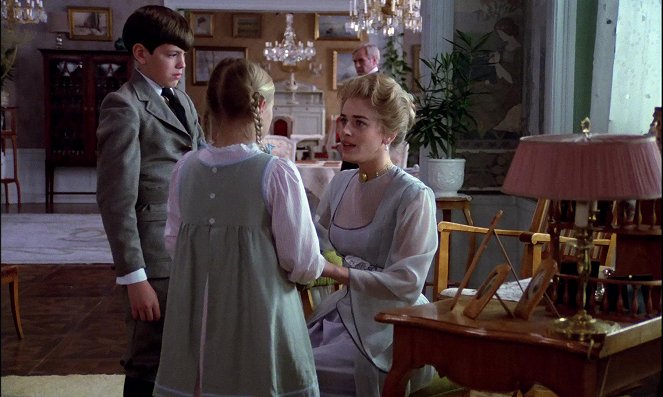Directed by:
Ingmar BergmanScreenplay:
Ingmar BergmanCinematography:
Sven NykvistComposer:
Daniel BellCast:
Pernilla Allwin, Bertil Guve, Börje Ahlstedt, Harriet Andersson, Mats Bergman, Gunnar Björnstrand, Allan Edwall, Stina Ekblad, Ewa Fröling, Erland Josephson (more)Plots(1)
Through the eyes of sister and brother Fanny (Pernilla Allwin) and Alexander Ekdahl (Bertil Guve), the many ups-and-downs of the Ekdahl family at the turn-of-the-twentieth-century are put on display. Bergman intended it as his swan song, and it’s the director’s warmest and most autobiographical film. (MUBI)
Videos (3)
Reviews (7)
In the same way that Oscar Eckdahl believes that his little theatre reflects a piece of the big world outside it, this little movie is a reflection of our big world too. Fanny and Alexander is the last of the Master’s film works (just television projects followed) and seriously he quitted when he was out on top. The three-hour version is a picture that lives a life of its own. The atmosphere sucks you in and gives you the feeling that you have been watching for much longer than the movie’s running time. But it’s a time pleasantly spent, avidly following the (ir)regular lives of the Ekdahl clan through Alexander’s innocent perspective. There is nothing to fault in terms of acting and technical considerations, perhaps just Bergman’s theatrical directing. But who cares when it’s so indescribably effective. Some day I would certainly like to see the five-hour cut, because there are a couple of places where it trails off a bit.
()
Watching Fanny and Alexander is not like watching an ordinary movie, it's more like reading a novel. It can be a bit demanding to watch it all at once, but returning to it in the right mood brings a delightful experience. Although Bergman's life confession lacks surprising or dramatic moments (and is therefore difficult to focus on), it is a captivating narrative with amazing performances and beautiful dialogues.
()
The first hour is full of life, physical pleasures, warm colours, and opulently furnished and spacious rooms, which give the protagonists a lot of freedom. Many characters, many micro-stories, the joy of discovery. After the father’s death comes a severe cooling, rigorous rules, austere interiors with minimal furniture, small closed rooms and more detail shots of faces. The family farce turns into a claustrophobic psychological horror film culminating in an extremely unpleasant scene in which Alexander is punished for letting his imagination run riot and taking the liberty of doing that of which Bergman’s autobiographical last will and testament is a celebration – telling a (fictional) story. There follows a magical scene of rescuing children, who at one moment appear to be in two places at the same time. Our willing to believe fiction (suspension of disbelief) is equally as important as fiction itself, those little worlds into which we can escape. The rules of the hitherto more or less realistic fictional world simply had to be broken in order for the children to escape the bishop and for the story to continue. Either accept it or let it be. Great art is born of great pain and the restriction of choice thus paradoxically stimulates Alexander’s imagination, which is his last refuge and on whose understanding and acceptance the third and most imaginative act of the film is focused. If Bergman truly excelled at anything, it was mise-en-scène direction. Few films prove this as convincingly as Fanny and Alexander, in which he captivatingly summed up the ideas and stylistic processes of his life’s work (even though the protagonists are children, the theme of aging and dying also emerges). The crowning work of a master at the peak of his powers. 90%
()
"The little guy is giving kisses like a big man!" It started out pretty good, Gustav Adolf was first only into women, but then... This needs to be watched at least as a series with a longer break because otherwise, it is impossible to tolerate the absence of the soundtrack, which turns the viewing experience literally into misery. Otherwise, of course, it's more palatable to regular Bergman viewers; they find their favorite themes (religion, interpersonal relationships, gender), and familiar faces and can easily reflect on the development of Swedish society over the last century. As a solitary film and a first encounter with Bergman, I don't recommend it (not least because this film was the one that cemented that strange era of art films in cheap book stores).
()
Unconventional Ingmar Bergman, who shows that he truly mastered the film medium and presents the viewer with a beautiful and painful childhood in Fanny and Alexander. They are adorable, but the world around them is not only beautiful. Childhood can be fun, it can hurt, and this is beautifully visible in this film, moreover, its visuals are simply enjoyable to the eye.
()
Gallery (105)
Photo © Svensk Filmindustri (SF)



Ads